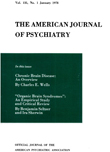Abstract
We have outlined, for the sake of simplicity, 3 groups of psychosomatic theorists. One assumes that the psychological make-up of the individual and the character of the psychological trauma determine the nature of organic illness. Another group believes that the structure of the patient's personality and the nature of his conflicts and psychological trauma have no direct bearing on the type of organic pathology he will develop. They assume that any kind of psychological stress may be associated with a pathogenic physiological concomitant leading to organic disease, the nature of which depends probably more on the physical than on the psychological make-up of the individual. The third group is not really worthy as yet of being characterized as a theoretical group. It consists of those who object to the lack of validation of the intellectually attractive specificity theories and yet are dissatisfied with the overgeneralized nonspecific theories. These theorists are using the "shotgun," or multidisciplinary, approach in an attempt to clarify the complex problems of phychosomatic medicine.
You may well ask, where does this leave me? That, we suggest, depends on your aims and the level of your interest. For example, it is important for the nonpsychiatric medical practitioner to be aware of the existence of the psychosomatic relationship and of the the fact that different opinions about etiology exist. Each patient should be treated as an individual, and no formula or set treatment regimen can as yet be applied to any particular problem. When treating an ulcer patient, it would in our opinion, be unwise to assume that he is therefore dependent and has problems in this area; what is important is to attempt to diminish his anxiety level in any way that will work uniquely for him.
The same general attitude ought to be taken by the psychiatrist. He will probably have a tendency to espouse a psychosomatic theory consistent with his particular psychiatric orientation; this is constructive so long as it gives him a useful frame of reference in working with patients. He should, however, be sufficiently flexible to be aware that he is dealing with theoretical constructs, not with proved facts. He should also be aware that his interpretations and psychotherapeutic manipulations may have profound physical effects on his psychosomatic patients and may seriously affect the course of the organic phase of the disease process.
And lastly we come to the "egghead," the "theoretical psychosomaticist." He should not be at all discouraged by the disagreements and the contradictions; to the contrary, he should thrive on them. There is a great joy in working on untrodden soil, especially when that soil is of as much intrinsic interest and importance as psychosomatic medicine. We are faced with a myriad of unknown phenomena and imperfectly understood relationships. As each theory is proposed, it should be scrutinized under the harsh and impartial light of the scientific method, which demands rigorous proof and validation.
We find it stimulating to work amidst such mystery, and rather than finding the lack of conclusiveness distressing, consider it one of the personal attractions offered by the field of psychosomatic medicine.

